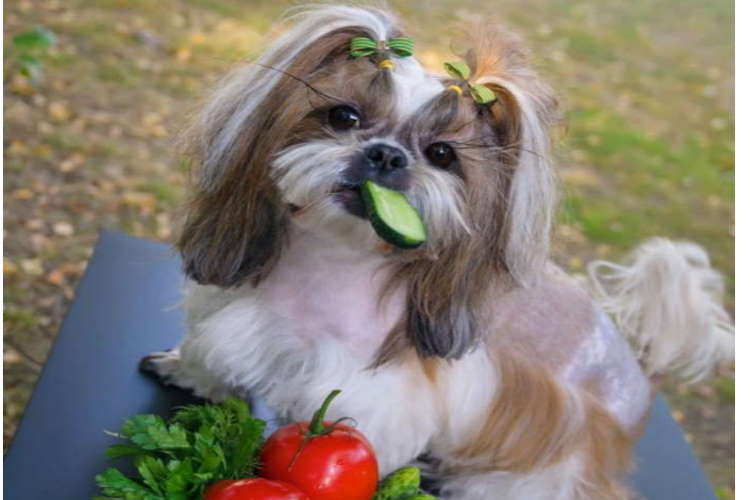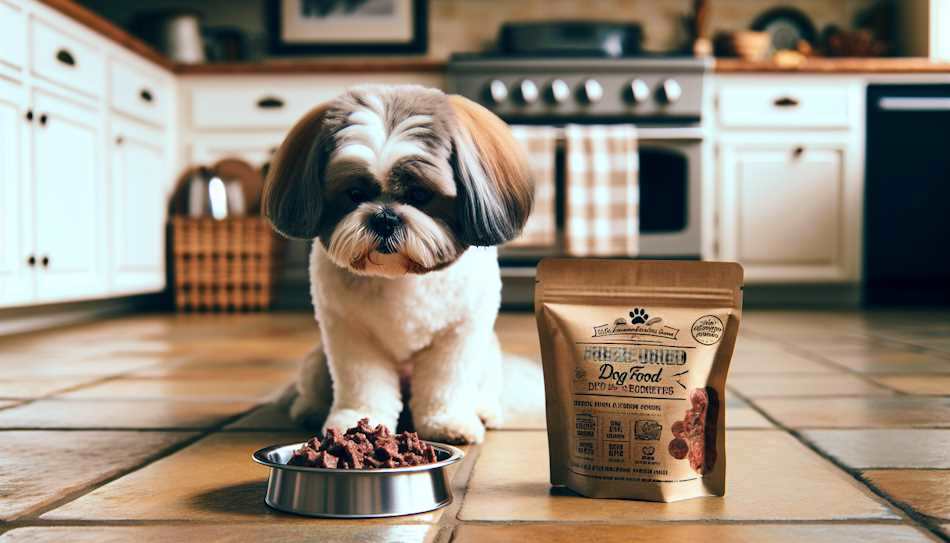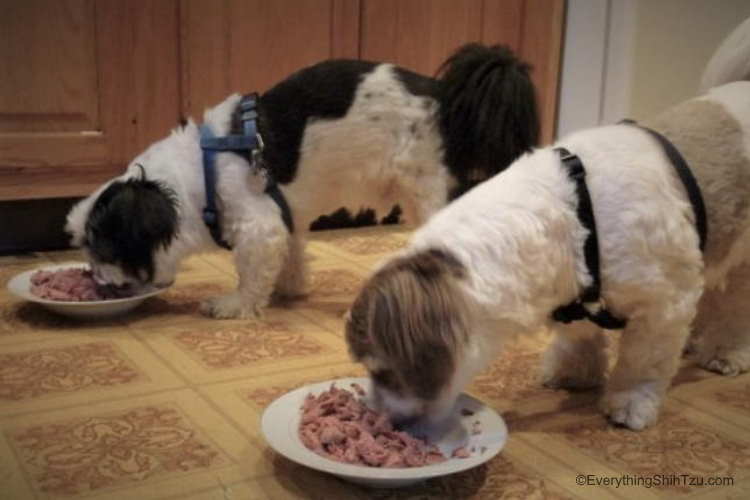- Home
- Shih Tzu diet
- Fruits and Veggies
Can Shih Tzu Eat Fruits and Vegetables?
What fruits and vegetables Shih Tzu can eat and which they cannot
BY MOLLY | EVERYTHINGSHIHTZU.COM
This post may contain affiliate links. Read privacy & disclosure policy for info
Fruits and vegetables are part of a healthy diet for humans, but this doesn't automatically mean that Shih Tzu can eat fruits and vegetables.
It’s important to remember that if a food is safe for one species, that does not mean it is safe for all species.
There are many foods that people can eat that can be very toxic to dogs.

Some fruits Shih Tzu can eat include apples, blueberries, cranberries and pumpkin, however they should never be given grapes or raisins as these can be toxic.
Green leafy vegetables like spinach and cabbage are generally good choices, however you'll want to avoid mushrooms and onions.
It is imperative to always check the safety of any table foods before feeding them to your pet.
Shih Tzu can experience many health benefits from eating certain fruits and vegetables.
Yet, there are several that are dangerous and could result in serious health problems for your Shih Tzu.
Below is a list of fruits and vegetables you can safely feed your Shih Tzu, and which ones to never feed them.
What Fruits and Vegetables are Safe for Shih Tzu to Eat?
There are several fruits and vegetables that are safe for your Shih Tzu to eat.
But, before feeding them to your pet, make sure to properly prepare them.
Wash and peel fruits and vegetables and remove all of the seeds and pits. Vegetables might be easier to consume if steamed first.
If your dog is overweight, be cautious with the amount of fruit you feed her, as fruit tends to be higher in sugar than vegetables.
Fruits OK for dogs to eat
- Apricots
- Apples
- Bananas
- Blueberries
- Cantaloupe
- Cranberries
- Mango
- Oranges
- Pears
- Pineapple
- Pumpkin
- Strawberries
- Watermelon
Vegetables Ok for dogs to eat
- Asparagus
- Broccoli
- Brussel Sprouts
- Carrots
- Cauliflower
- Celery
- Cucumber
- Green beans
- Lettuce
- Peas
- Spinach
- Sweet potato
- Zucchini
These options can be a yummy treat for your dog, but as with all table food, they should be given in moderation.
Keep reading to learn how adding these fruits and vegetables to your Shih Tzu's diet could be beneficial for your dogs health.

- Apricots (but not the pit, stem or leaves)
This fruit is rich in potassium and beta-carotene which has been found to have great health benefits.
- Apples (but not the seeds)
Apples make a great snack choice for overweight pets since they are high in fiber and low in fat.
They contain vitamins A and C which are good for healthy bones and tissue.
- Asparagus
Asparagus has lots of potassium, fiber, and vitamins. However, it should be served cooked and in bite-sized pieces to prevent choking.
- Bananas
Bananas are high in sugar, so they should definitely be given sparingly, but they are full of potassium and may help support the heart and kidneys.
- Blueberries
Blueberries may help prevent urinary tract infections and also aid night vision.
They are high in antioxidants which could help prevent cell and tissue damage.
- Broccoli
Small pieces of broccoli can be a yummy treat for dogs, and it’s high in Vitamin C, but too much can lead to stomach upset.
- Brussels Sprouts
Many dogs don’t show too much interest in this particular veggie, but if your dog wants to give it a try, serve them cooked and in small pieces.
Brussels sprouts are rich in Vitamins C and K.
- Cantaloupe
Cantaloupe has a lot of anti-inflammatory benefits for dogs, but make sure they only eat the fleshy part of the fruit.
- Carrots
Munching on carrots can be good for your dog’s teeth while delivering healthy doses of beta-carotene.
- Cauliflower
Cauliflower is best served cooked, plain and in small amounts to avoid stomach upset.
It has anti-inflammatory properties and can also support digestive health.
- Celery
This crunchy treat is loaded with antioxidants and can help freshen your dog’s breath!
Doesn’t this make you want to run out and buy a bunch of celery?
- Cranberries
Cranberries may help fight urinary tract infections and are also high in Vitamin C, fiber and manganese. (see footnotes)
Dogs can enjoy this fruit raw, cooked or dried, but should avoid cranberry sauce and juice, which is very high in sugar.
- Cucumbers
Cucumbers are an excellent choice for overweight pets due to their extremely low fat content. They can help lower blood pressure, and also are a good way to freshen your dog’s breath.
- Green Beans
Green beans deliver a good source of protein and iron.
- Lettuce
Lettuce can be shredded and added on top of your dog’s food to add fiber and water.
This may help your dog stay hydrated and feel full.
- Mango
Mangoes are packed with vitamins. This can be a tasty treat for your dog, and the soft flesh is easy for dogs to eat.
But, make sure to remove the poisonous pit.
- Oranges (But not the seed, peel, leaves or stem)
The Vitamin C found in oranges may help a dog’s immune system and flush toxins from the body, but give it sparingly to avoid an upset stomach.
- Pears - (But not the seeds)
Pears have lots of Vitamin A, K and fiber and can be enjoyed in moderation. And according to Healthline, pears also contain anti-cancer properties.
- Peas
Peas can boost your dog’s energy level and promote bone health. They contain Vitamin B, thiamin and potassium.
- Pineapple
Pineapple is loaded with vitamins and minerals, like folate and zinc, that can help your Shih Tzu’s digestive and immune systems.
It is very high in sugar, however, so feed it in very small amounts and infrequently.
- Pumpkin
Pumpkin is a great way to ease constipation in dogs. It can help your dog stay hydrated and is full of vitamins and minerals.
Don’t confuse it with pumpkin pie filling though, which is loaded with unhealthy sugar and spices.
- Spinach
Spinach contains almost every vitamin and mineral, and it makes a good snack for your pet.
However, it can exaggerate existing kidney problems, so avoid it if your dog has issues with its kidneys.
- Strawberries
Strawberries can strengthen the immune system and slow age-related issues.
- Sweet Potato
Sweet potatoes are high in fiber and have many vitamins and nutrients that can aid in digestion.
- Watermelon
Watermelon is a great snack to help your dog stay hydrated.
It helps maintain healthy muscles and nerve function because of its potassium content, and it is loaded with Vitamins A, C, and B6.
- Zucchini
Zucchini contains potassium, Vitamin C and magnesium.
It can potentially protect your dog from certain cancers, cardiovascular disease and different infections. (see footnotes)
What Fruits and Vegetables are Harmful to Shih Tzu?
It may have surprised you to learn there are certain fruits and vegetables you should never give to your dog.
While some may only cause you dog stomach problems in small doses, others can be extremely toxic to your dog.
Fruits and vegetables that could harm your dog
- Apple seeds
- Apricot pits
- Avocado
- Cherries
- Citrus Fruits
- Dried Currants
- Garlic
- Grapes/Raisins
- Mushrooms
- Onion
- Orange Peels, Seeds
- Pear Seeds
- Raw & Green Potatoes
- Rhubarb
- Tomato Plants
Although it's best to avoid giving your dog any of these "do not eat" foods, sometimes it is unavoidable. So, what should you do if your dog happens to eat these forbidden fruits and veggies?
We'll get to that in a moment, but first, we'll briefly explain why these particular fruits and veggies could be harmful to your dog.
- Apple Seeds
While apple slices might be a crunchy treat for your dog, apple seeds contain cyanide.
Avoid giving the apple core or seeds to your dog so that he doesn’t ingest this toxic substance.
- Apricot Leaves, Stems and Pits
The flesh of the apricot is a great snack for dogs, but the leaves, stem, and pit are poisonous.
- Avocado
Avocados contain a toxin called “persin” in their seeds and skin that can cause diarrhea and vomiting in dogs. In large doses, it can be toxic.
- Cherries
Cherries are toxic to dogs. The pits, leaves, and stems can cause respiratory failure and even death.
The pulp is believed to be okay to eat, but there are safer options available, so best to err on the side of caution.
- Citrus Fruits
Although not toxic, citrus fruits like lemons, limes, oranges, and grapefruit can cause an upset stomach.
- Dried Currants
This small fruit is very toxic to pets and can cause renal failure.
- Garlic
When dogs consume garlic in large doses, it's believed to damage red blood cells and cause anemia.
There are some people that believe small amounts to be okay, however, this is a matter of debate. (This includes garlic powder and minced garlic)
- Grapes/Raisins
Grapes and raisins may cause kidney issues in dogs and lead to renal failure and even death.
The substance in the fruit that causes these problems is unknown, so the entire fruit should be avoided.
- Mushrooms
Mushrooms contain substances that are highly toxic to dogs.
These toxins can affect a dog’s nervous system and digestive system. In some cases, they can even cause shock and result in death.
- Onion
Onions contain different substances that may damage red blood cells and result in anemia in dogs. (This includes onion powder)
- Orange Peels, Seeds, Stems, and Leaves
These parts of an orange may contain poisonous oils, so make sure your pet only eats the fleshy part.
- Pear Seeds
Just like apple seeds, pear seeds contain cyanide and are toxic.
- Raw and Green Potatoes
Potatoes can be found in many dog foods, but consuming raw, unripe and green potatoes are toxic to dogs and humans! Potato toxicity can cause vomiting, nausea, heart irregularities and seizures.
- Rhubarb
Rhubarb leaves are believed to be very toxic to dogs.
Eating the leaves may cause issues for the dog’s nervous and digestive systems and to the kidneys.
- Tomato Plants
Ripened tomatoes might be okay, but the plant and un-ripened fruit may cause severe intestinal upset.
What Should You Do If Your Shih Tzu Eats a Harmful Fruit or Vegetable?
Of course, prevention is the best medicine.
Make sure to keep all toxic substances, including questionable food, out of your dog's reach.
Still, even with the most diligent preparation, accidental poisonings happen every day.
If you believe your Shih Tzu has eaten something harmful, it is best to seek medical attention immediately.
If you are in doubt, seek medical help. It's always better to be safe than sorry.
Sometimes your pet might not show any signs that it has eaten something poisonous. Other times, symptoms might take a while to appear.
Some clues that your pet might have ingested something toxic are:
- Vomiting
- Diarrhea
- Lack of coordination
- Shaking
- Coughing or sneezing
- Trouble breathing
- Seizures
- Unusual behavior, such as loss of appetite, extreme tiredness, drinking large amounts of water, and excitability.
If your pet shows any of these signs, or you think it's ingested poison, don't panic.
According to the Pet Health Network, you should not induce vomiting in your dogs, as it can cause more harm when it it's not appropriate.
This could make things worse by damaging the esophagus.
Instead, put your pet in a safe place, away from any suspected toxin, and call your vet immediately.
If your vet is closed, call the nearest 24-hour animal clinic, or the ASPCA's emergency poison control hotline at 1-888-426-4435.
Fruits and vegetables are generally a healthy part of any diet, but for dogs, some fruits and vegetables can be harmful and even deadly.
Keep your Shih Tzu safe, by arming yourself with the right knowledge and a plan.
You should have an emergency plan in place for when your pet gets into a sticky situation.
Make sure that all necessary phone numbers are easily accessible.
Don't wait for something to happen.
Having an emergency plan in place for your pets not only saves time, but it can save your pet's life.
Sources:
Healthline - 12 Health and Nutrition Benefits of Zucchini
Healthline - 9 Health and Nutrition Benefits of Pears
NCBI - Free radicals, antioxidants and functional foods: Impact on human health
Medical News Today - Cranberries help urinary tract infections, but not as juice
ASPCA - pets and produce
- Home
- Shih Tzu diet
- Fruits and Veggies



